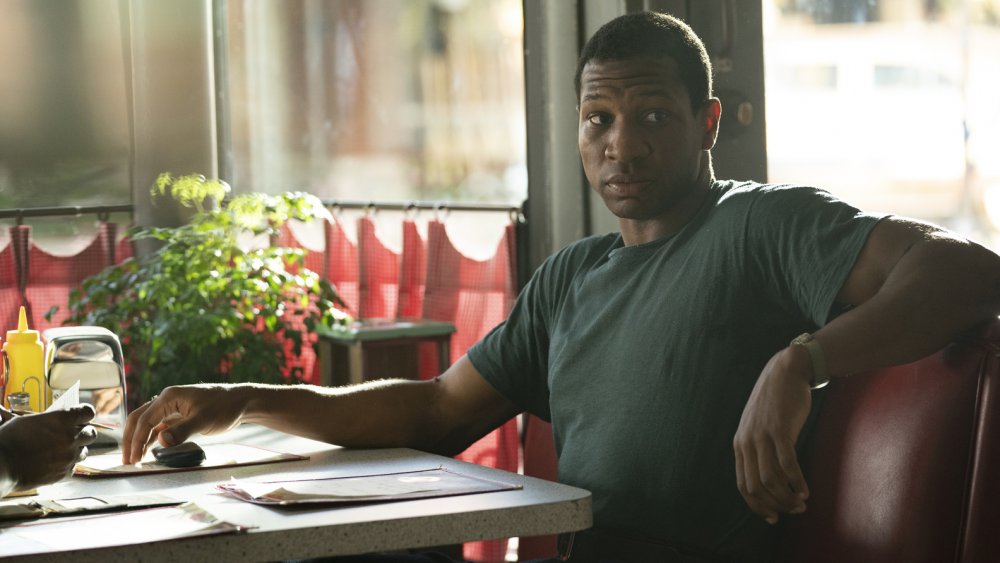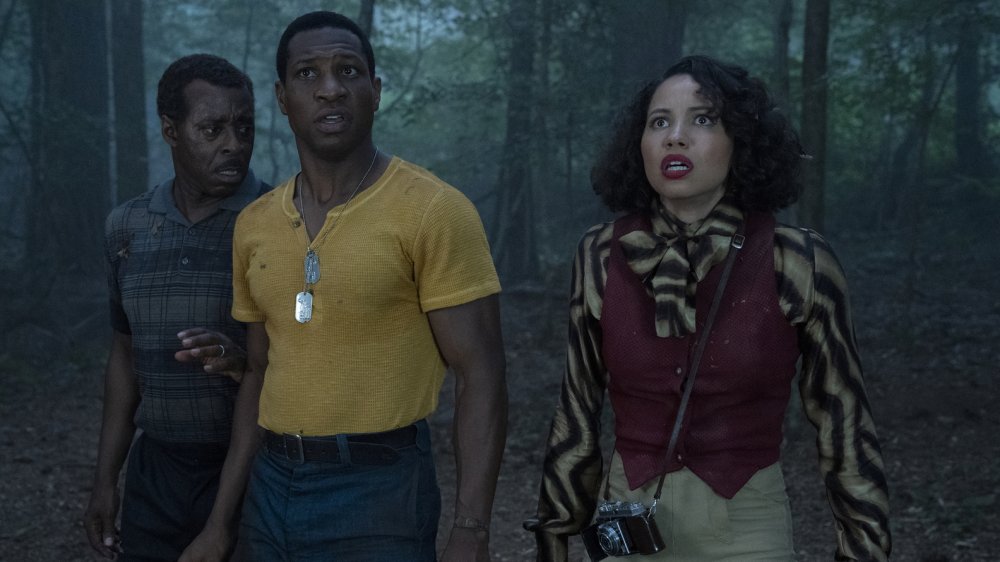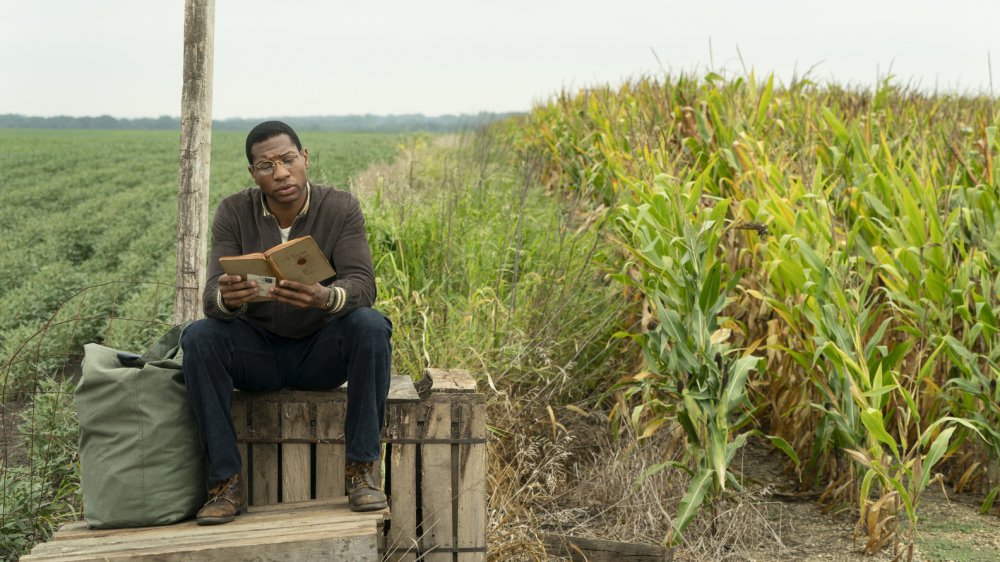Lovecraft Country Star On Legacy, Masculinity, And Monsters
You know him from The Last Black Man in San Francisco and Spike Lee's recent Netflix feature Da 5 Bloods. Now, Jonathan Majors is the star of a new genre-bender that recently premiered on HBO called Lovecraft Country. On the series, Majors plays Atticus Freeman, a Black man and bookworm who's particularly fond of the pulpy sci-fi horror work of author H.P. Lovecraft. Atticus is also a Korean War veteran who returns home to find out that he has received a letter from his missing father.
He soon goes on a search that reveals new secrets about his mother, his lineage, and how he's connected to a mysterious cult referred to as the Sons of Adam. Not long after, Atticus heads out on the road with two companions; their journey transforms into a dark and wild adventure involving the occult, monsters, and much more.
"He is a man of intellect. He is a man of heart. He's a man of his body," said Majors while describing his character at a virtual press junket recently attended by Looper. "He's a son, he's a lover, he's a soldier, he's an adventurer, he's all of these things. And he's male and he's Black."
Warning: Spoilers for Lovecraft Country are ahead.
Jonathan Majors on why Lovecraft Country completes his trilogy on Black masculinity
Majors was then reminded by a fellow journalist that he previously told The New York Times that Lovecraft Country completes his trilogy on Black masculinity. It seems there's a connective tissue in the themes explored with Atticus and with Majors' other characters in The Last Black Man in San Francisco and Da 5 Bloods.
"I was in a conversation with somebody and they said, 'Yeah, those three guys, they're different, the war is the same, but the mission is different,'" Majors explained. "And it is in some ways to be a corrective [...] and an anecdote to the toxic masculinity, particularly Black masculinity, that society has put on, in many cases, Black men. And also the willing chains that many of my compatriots put on ourselves, the limitations we put on ourselves, that we must behave a certain way, or that we must think a certain way."
He summarized, "With these three fellows, Atticus allows us to expand that. And it's on a platform where people can see that. I think it's a very ambitious thing to say."
On Lovecraft Country, Atticus also comes face-to-face with racism as he follows his father's trail of breadcrumbs through 1950s America. The show takes place during the Jim Crow era, when segregation was commonplace and an act as simple as driving down the street could spell doom for a Black man or woman depending on what time of day it was. Additionally, Atticus must deal with the trauma and painful knowledge that comes with some of the answers he finds during his quest for truth about his family's legacy.
"When I think legacy, I think, 'Oh, we're talking about the tribes of Africa and we're talking about the dynasty of the Obamas' and all these things. I think where people really f*** up is that legacy is everything. Legacy is the slavery," said Majors when asked to elaborate on the painful side of legacy explored on Lovecraft Country and how he worked to express that on screen. "Particularly to the Freeman bloodline, there's the fact that Atticus is made up of half slave, half Freeman. It gets revealed on episode 2 that the Freemans were never slaves. It was [Atticus'] mother's side that were slaves. So, he's walking around, inside of him, a free man and an enslaved woman."
Lovecraft Country is a family drama that turns dark
On the second episode of Lovecraft Country, Atticus also learns that he's related to the Braithwhites– a white family bloodline whose members saw minorities, including women, as inferiors—a plot reveal that seemingly struck a chord with Majors.
"Atticus is also part of the Braithwhite family. That in and of itself, to me, is the most uncomfortable thing to wrestle with as an African American: that you are probably the descendant of the same people who enslaved you," said Majors. "And you can't deny that. You are that as well. You have that Scottish, German, English, et cetera, in you. That's what happened with Atticus. And so, to take all that on and then to decide what to do with it — how to either add to it, how to mitigate it, how to live with it — is the story of our characters. Then you have the legacy that you are going to push forward. That's the story of Atticus. That's what each episode is."
When asked about what alluring qualities jumped out at him while first reading the Lovecraft Country script, Majors was quick to list out the character traits in Atticus he hadn't really seen before, and explained why he ultimately signed on for the series.
"I have a very investigative nose. As I'm reading it, I go, 'Wait, wait, wait, wait, wait.' The way he's described, he's a Korean War veteran, which is important because the Korean War is quite different than the other American wars," said Majors. "He's a Korean War vet as well as Black man and he's traveling. And he's a bibliophile. Okay, that's not something I've seen before. And he's searching for his father and I go, 'Oh, well that's something I understand.' That was enough for me."
But little did Majors know at the time that Lovecraft Country was more than just a typical drama. Viewers learn this very early on, notably during the blood-soaked conclusion of the series' first episode.
"I entered the project with the mindset that it's a family drama. We're going to deal with dad, uncle George, Leti – all these things," said Majors. "As we began to move through the scripts, the story became more and more complex, and more and more unreal and fantastical and therefore, surreal. And therefore what I call 'dark s*** reality.' Which is what I am into, dark s*** reality. So, the challenge of it was great. I was interested in giving it a go."
New episodes of Lovecraft Country air every Sunday at 9 PM PT on HBO.


